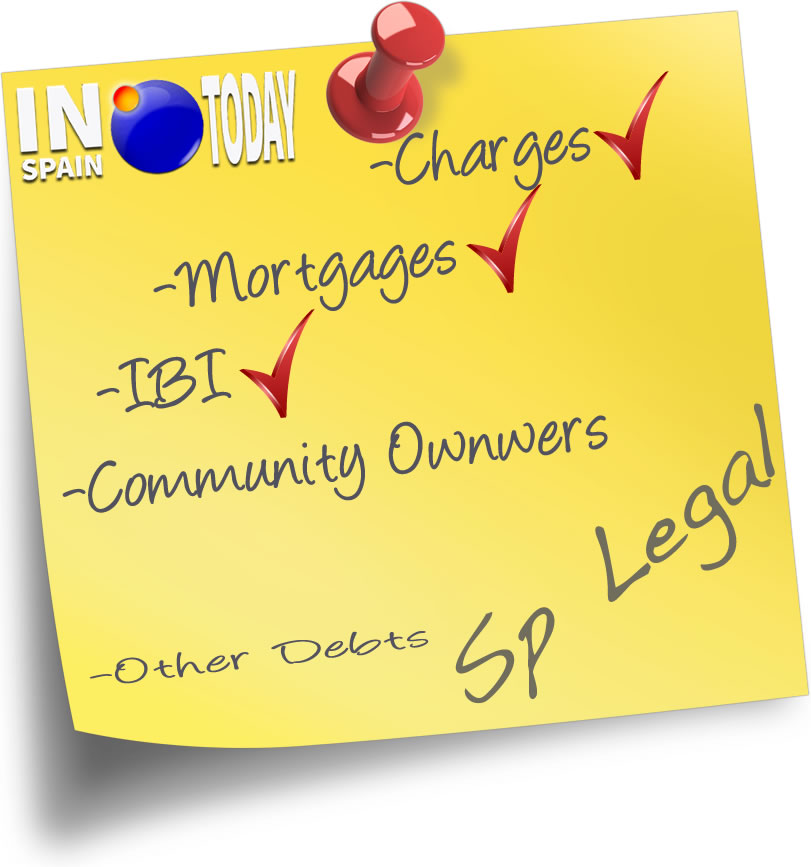


PROPERTY CHARGES |



The charges are limitations on the enjoyment or ownership of a property. In Spain the law requires that they should be in a public document and inscribed in the Land Registry. But Could be other debts of which the property is liable, that do not appear in the Land Registry. It is a must to do all the Due diligence process checking the property in Spain before the purchase.
The charges on property can be economic, such as the mortgage, in which the property behaves as guaranty for the repayment of an amount borrowed. Or, on the other side, they can be Third parties' legal rights that limit the enjoyment of the property by the owner, such as easements in which a third party has a right to use or enjoy the property in some way.
Finally, there are other charges that attract the property as a warranty, no matter who was the debtor.

The mortgages in Spain are immovable real rights, which are granted to secure the payment of a loan or credit, giving to its holder a right of realization of an asset (usually real estate) which, although with the charge, remains under the possession of its owner. The mortgagee may, if secured debt is not satisfied on time, promoting the forced sale of the property encumbered by the mortgage, and so, receive the amount guaranteed. Lately the banks in Spain have opted for the repossession of the properties.
Is a Charge by which a property is declared affected or restricted in its rights in favor of a creditor, which will receive the debt with the value obtained by judicial sale. The debt may be already declared (executive embargo) or can be in advance, when is expected to be declared in a future ruling (preventive attachment).
Afección Fiscal (Tax Attachment)
It is warning message displayed in the information about a property at the Land Registry. Each time it is done a legal act on a property (purchase, mortgage, inheritance, ...) is a must to pay taxes. The amount paid to the administration is calculated by the taxpayer (or his advisor) and, initially, the authorities take it for good. The problem is that there is a period of five years for this tax declaration to be revised and checked if it was made in the right amount. The warranty for the Tax Authorities to receive the correct amount is the property itself. It is therefore important to check the amounts paid in tax returns made about the property, prior to the purchase. Over five years old attachments are expired and can not be claimed.
Condición Resolutoria (Resolutory Condition)
It is a guarantee of compliance with the buyer's obligation in purchase contracts when a part of the price is deferred.
Under this clause, the parties agree that the failure paying the purchase price or any of its installments (usually promissory notes) will result in the full cancellation of the contract, returning the property to the seller and losing the the buyer the amounts paid up to date.
Cargas Urbanísticas (Urban Charges)
When is being done an urban development, whereby a land of rustic nature become urban land on which to build is permitted, it is necessary a development project according with the urban planning to implement the infrastructure that the area requires (streets, housing supplies, public parks, etc ...). These works have a cost that is waged among the plots resulting from the project. To secure the payment of such expenses the plot acts as guaranty and therefore the charge appears in the Land Registry until is paid. The Urban charges are one of the hidden risks buying property in Spain.
It is a right of enjoyment of a property that is not ours. The usufructuary has the thing but does not own (has possession, but not ownership). He can use it and enjoy it, or even lease it. Therefore he can not alienate or diminish without the owner's consent. A usufruct may be for a fixed term or even lifetime. Its duration is to appear in the Land Registry.
Servidumbres (Servitudes or easements)
They are Burdens on a property for the benefit of another estate belonging to a different owner, but also there are easements that may be established for the benefit of one or more persons, or a community, with no relationship based on the property. Some of them are set by the command of the law but others can be created by agreement between the owners of the two properties. Here are some examples:
Right to light and views. It is the right to open holes in the wall for light or views. The Spanish Civil Code regulates how far has to be that wall from the adjoining property and what should be the dimensions of the windows.
Water easements. It encompasses a range of possible water-related rights that are, among others, from the servitude of aqueduct, by which the servient tenement allows water supply to the dominant tenement; Or sewage easement that allows the channeling of wastewater through the servient estate.
Right of Way. The owner of a land, nestled among others without exit to the public road, is entitled to require passage by the neighboring properties, provided in the least intrusive way for property rights of servant properties.
Party wall. It is a legal easement under which the owners of two neighboring properties having common dividing walls or fences, are subject to the reciprocal obligations.
There are other charches thar could not appear at the Land Registry but the property behaves as a warranty, no matter who was the debtor:
The property local tax (IBI in Spain) must be paid by who is the owner of the property the January 1st of every year. But if this tax is unpaid by the prior owner, the buyer could be claimed to its payment for the last four years.
The acquirer of a property whose seller and previous owner kept debts related to the Community of owners, has the obligation to pay the portion of that debt that has been accrued in the year in which the transmission is made and the three preceding years.
RELATED INFO |
Services by
|
Search property in Spain |
Do not pay for our servicesBuying a property in Spain with us our fees as lawyers, economists, appraisers and real estate agents are free. |
We take care of everythingLegal advice. Due diligence. Tax advice & returns. Appraisal. Contracts & Deeds. Property Registration... |